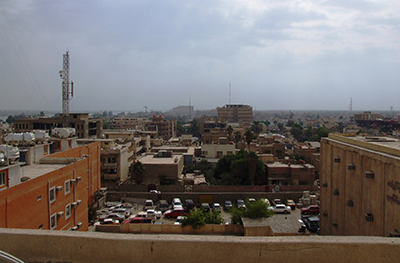When Hayder Al-Mohammad speaks about Iraq, he does so with firsthand knowledge. Al-Mohammad, who was born in Iraq but grew up in London, returned to his native country in 2005 to conduct anthropological research and provide a more accurate portrayal of Iraqi life in the wake of the United States-led 2003 invasion.
He brings that unique perspective to his new position as an assistant professor in UW-Madison’s Department of Anthropology. We asked the socio-cultural anthropologist about his work in Iraq, as well as lighter fare.
 The view to the south from near the center of the city of Basra in southern Iraq. Hayder Al-Mohammad conducted research out of Basra during his time in Iraq.
The view to the south from near the center of the city of Basra in southern Iraq. Hayder Al-Mohammad conducted research out of Basra during his time in Iraq.
Q: Tell us about your work.
A: One of the things I am trying to do is convince people who are not specialists, and those who have proclaimed specialism, that the picture of life in Iraq after 2003 (though before as well) being sold in the international media and political science texts is the stuff of fairy tales. I try to show in my work that the problems most Iraqis face in their everyday lives have little to do with sectarianism and fault lines between communities within the country.
Q: Why did you decide to study Iraq?
A: It was sort of forced on me. Leading up to the invasion of Iraq in 2003 so much hot air and bluster had taken over talk of Iraq. Also, let us not forget most of the commentators appearing on the news and panels in academic conferences not only had never been to Iraq, they also did not speak or read Arabic. While that machinery was working, I went to Iraq in the mid-2000s and have slowly been trying to introduce some field-based insights.
Q: Why are you most excited to be at UW-Madison?
A: What excites me about any place is the people. Everyone I met when I visited the university for my interview was extremely nice. More than that, I got a sense that the faculty and students were committed, excited, and interested. When others are keen and doing important work, you want to be part of that.
Q: What courses will you teach?
A: Phenomenology of Religious Life, Anthropology of the Middle East, Living Islam: The Anthropology of Islam, and I’m working on another one at the moment.
Q: If you weren't in your field or academia, what would you be doing?
A: I have a dream of opening a coffee shop in Basra, in the south of Iraq, one day. Maybe I would be doing that.
Q: What do you like to do outside of work?
A: There’s an “outside of work?” In all seriousness, it is rather difficult to unplug from the news and what is going on in the Middle East if that is where you are from and also researching and writing about. If I did not have the outlets of writing and teaching about the Middle East, I think I would drive the people I know mad.
Q: What’s your favorite food?
A: It’s about the company you share food with, for me. Bread and cheese could be a banquet in the right company and mood.
Q: Who’s your go-to artist on your iPod?
A: I’m a cassette man, and these days I listen to Abdul Wahid Ju’ma, Zoor Hussain and Paul Desmond.
To meet more new faculty members, see our full list of Q&As.